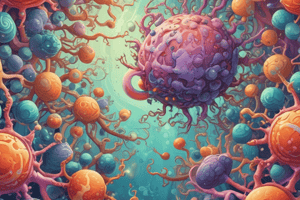Podcast
Questions and Answers
Which line of defense is the adaptive immune response a part of?
Which line of defense is the adaptive immune response a part of?
- First line of defense
- Second line of defense
- Third line of defense (correct)
- None of the above
What are some examples of mechanical barriers in our bodies?
What are some examples of mechanical barriers in our bodies?
- Mucus (correct)
- Interferons
- Macrophages
- Hydrochloric acid
What is the role of sebum in the body's defense mechanism?
What is the role of sebum in the body's defense mechanism?
- Destroy pathogens in the stomach
- Secrete pathogen-inhibiting agents (correct)
- Ingest and destroy microorganisms
- Hydrolyze pathogens
What is the process of phagocytosis?
What is the process of phagocytosis?
Which line of defense includes inflammation and fever?
Which line of defense includes inflammation and fever?
What are some examples of chemical barriers in our bodies?
What are some examples of chemical barriers in our bodies?
Which line of defense forms a wall to protect the internal environment from foreign cells?
Which line of defense forms a wall to protect the internal environment from foreign cells?
What is the role of mucus in the body's defense mechanism?
What is the role of mucus in the body's defense mechanism?
What is the role of hydrochloric acid in the body's defense mechanism?
What is the role of hydrochloric acid in the body's defense mechanism?
Which type of immune cells are responsible for phagocytosis?
Which type of immune cells are responsible for phagocytosis?
Flashcards are hidden until you start studying
Study Notes
Lines of Defense
- The adaptive immune response is part of the specific defense line
- The innate defense line includes inflammation and fever
Mechanical Barriers
- Examples of mechanical barriers in our bodies include skin, mucous membranes, and epithelial lining of respiratory, gastrointestinal, and genitourinary tracts
Chemical Barriers
- Examples of chemical barriers in our bodies include sebum (antimicrobial properties), mucus (traps pathogens), and hydrochloric acid in stomach (kills ingested pathogens)
Phagocytosis
- Phagocytosis is the process where specialized cells engulf and digest foreign substances and pathogens
- Phagocytosis involves the ingestion of foreign particles by cells, such as neutrophils and macrophages, which are responsible for this process
Studying That Suits You
Use AI to generate personalized quizzes and flashcards to suit your learning preferences.




